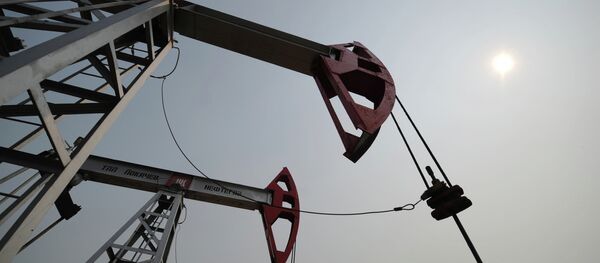MOSCOW, December 26 (Sputnik) – Saudi Arabia announced its 2015 budget Thursday revealing a $39 billion deficit due to sliding oil prices; although the crude-producing giant did not reveal at what price of oil the country calculated its 2015 budget, John Sfakianakis, the former chief economic adviser to Saudi Arabia’s Ministry of Finance, assumes the new budget has been calculated based on oil price of $80 a barrel.
The International Monetary Fund (IMF) estimates a fiscal break-even price for Saudi Arabia is more than $90 a barrel, the Australian said.
The Kingdom’s 2015 budget includes 860 billion riyals ($229.3 billion) in spending expenditures and 715 billion riyals ($190.7 billion) in revenues, according to RT.com. Next year budget reveals a cut in revenues of around $88 billion from 2014 due to the plunge in global oil prices. The country promised to cover the budget difference by producing more oil from its vast reserves.
Although extremely wealthy, Saudi Arabia has deep income inequalities and youth unemployment. Two-thirds of all Saudis are employed by the government. The country also plans to cut back on salaries and allowances that account for about 50 percent of total budgeted expenditures, according to the Finance Ministry. However, the move could anger Saudi youth, who make up a majority of the population and who struggle to find affordable housing and salaries to cover the costs of living in the country, the New York Times said.
However, Kingdom officials said the country would go ahead and continue with its previously set spending plans. According to the Australian, the expected budget deficit is unlikely to have a major effect on Saudi Arabia, as the country has $750 billion in foreign-exchange reserves from oil sales.
During the latest OPEC meeting in Austria, Saudi Arabia said it would not decrease its oil production, despite oil prices dropping nearly 50 percent since the summer. Ali Al-Naimi, the country’s oil minister, said Saudi Arabia would not reduce production of its oil, even if oil prices kept falling further. Experts interpreted the decision as trying to eliminate new oil producers from North America, who produce shale oil and can only be competitive if prices for crude oil remain high. However, slumping oil prices hurt the economies of other oil producing countries, such as Russia, Iran and Venezuela.



